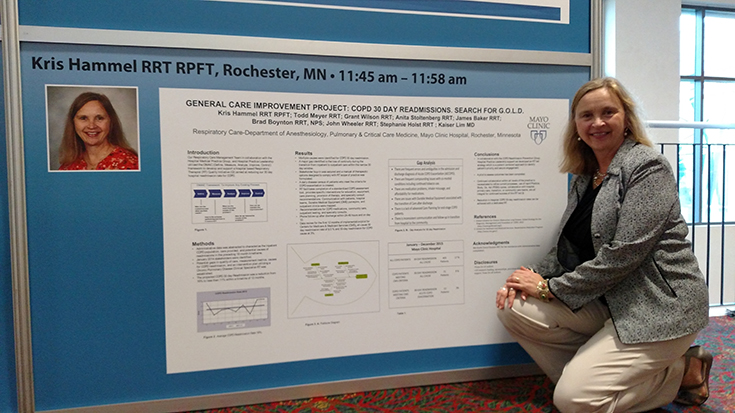
This edition of our “Open Forum Series” features an interview with Kris Hammel, RRT, RPFT, a chronic pulmonary disease clinical specialist in the respiratory care department at the Mayo Clinic in Rochester, MN. Hammel’s abstract, “General Care Improvement Project: COPD 30-day Readmissions. Search for G.O.L.D.,” was presented during the Editors’ Choice session at AARC Congress 2016 in San Antonio in October.
Why did you decide to target COPD 30-day readmissions in your quality improvement initiative and what kind of support did you get from your facility administrators?
We identified gaps where a chronic pulmonary disease clinical specialist RT could help with reducing hospital 30-day readmission rates for COPD patients. Hospital leadership at all levels fully supported the initiative. After six months showing the benefit of this COPD care team model, my FTE and two more RTs were approved for seven days a week access.
What were the main components of the initiative and who developed them and carried them out? How many of your staff members were involved?
The authors — there were nine of us — used QI processes — specifically, Define, Measure, Analyze, Improve and Control, or DMAIC — along with various QI tools to identify our COPD population and develop the framework for the chronic pulmonary disease clinical specialist responsibilities and select an experienced clinical specialist RT. This included readmission data, developing partnerships, identifying stakeholders, and collaboration across the inpatient Mayo Clinic hospital practices, including nursing, pharmacy, and social work.
What were the biggest challenges you faced as you carried out the initiative and how did you overcome them?
Patients admitted for COPD exacerbation were not being seen for various reasons. Processes were not in place to identify them being hospitalized. The clinical specialist RT worked Monday-Friday, so some patients may have been dismissed before COPD assessment and education was provided.
We modified automatic, daily electronic reports from the emergency department to expand the reason for admission to include COPD exacerbation, dyspnea, pneumonia, and shortness of breath; added an electronic order for COPD RT consult that automatically populates a worklist that a nurse, physician, physician assistant, or advanced practice RN can enter; attended daily multidisciplinary rounds; and received FTE approval to have three RTs for seven day a week, ten hour shift coverage.
How did it feel to learn that your abstract had been accepted to the Open Forum — and most especially, that it was selected for the Editors’ Choice section?
It was a privilege and honor to be selected as one of the Editors’ Choice abstracts and share how any RT department can develop and successfully lead a COPD readmission reduction care team.
How do you think conducting an initiative like this and presenting it during the Open Forum is helping to further your career in respiratory care?
Because of the positive outcomes in reducing 30 day COPD readmissions, our hospital leadership has another reason to hold the RT in high regard. I would hope other RTs that are passionate and willing to put the work in and follow through on implementing an idea to improve patient care — it doesn’t have to be COPD — can use our experience with the Open Forum as an example.
Why is it important for therapists such as yourself to look at outcomes of the care they provide, devise programs to improve them, and then share the results with their peers via the Open Forum?
Ultimately, the needs of the patient come first. We, as RTs, have a lot of great ideas and not all the answers. Together with collaboration, sharing of experiences with peers, and implementation of safe, quality improvement processes, the patients benefit. Presenting this year and attending the Open Forum throughout the years has given me a way to network with other RTs who are also involved with similar initiatives.





